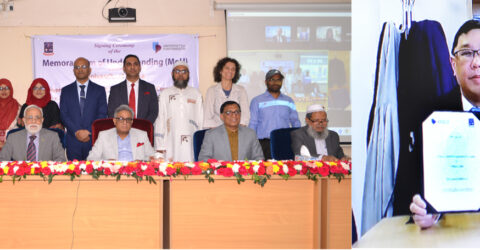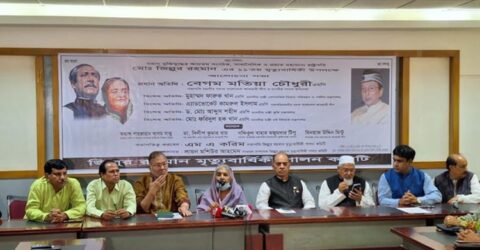PM seeks D-8 leaders’ role for sustainable solution of Rohingya crisis
The Bangladesh The Bangladesh
Today

DHAKA, – Prime Minister Sheikh Hasina today urged the D-8 leaders to come forward for a sustainable solution to the Rohingya crisis and address the challenges posed by climate change alongside laying emphasis on trade, investment, cooperation and harnessing the power of youth.
“I would like to urge you (D-8 leaders) to put pressure on Myanmar for taking back the Rohingyas,” she said, expressing her concern that if the crisis is not resolved, it may create security concerns in the region and beyond.
She mentioned the Rohingya crisis as an urgent issue for Bangladesh as it is causing severe impact on the country’s environment, society and the economy.
The premier was addressing the 10th D-8 Summit virtually as chair. Bangladesh hosted and chaired this summit at a unique time when the country is celebrating the birth centenary of Father of the Nation Bangabandhu Sheikh Mujibur Rahman and Golden Jubilee of its independence.
Shikh Hasina said Bangladesh gave shelter to 1.1 million Rohingyas of Myanmar on humanitarian grounds, but it insisted from the beginning that they (Rohingya) have to go back to the Rakhine State in Myanmar in a safe, dignified, voluntary and sustainable manner.
“Unfortunately, it has been more than three years after their influx into Bangladesh, and the repatriation process is yet to be started,” she noted.
On the outset of the summit, Bangladesh took over the term chairmanship of D-8 from Turkey for the second time.
Turkey’s President Recep Tayyip Erdogan delivered the opening remark and then handed over the Chairmanship to Bangladesh Prime Minister Sheikh Hasina.
Prime Minister Sheikh Hasina was also in the Chair when Bangladesh hosted the 2nd D-8 Summit in Dhaka in 1999.
In the summit, Sheikh Hasina made an urgent call to the leaders for a meaningful cooperation among the D-8 member countries for adaptation and mitigation measures, referring to Bangladesh’s experiences regarding the issues of climate changes.
“For effective and sustainable development within D-8, it is now imperative that we cooperate and assist each other in climate change issues,” she said.
The Bangladesh premier said her country has achieved phenomenal socio-economic growth even after the increasing frequency of natural disasters.
In addition to the COVID-19 pandemic, she said, Bangladesh had to bear the brunt of cyclone Amphan and prolonged flood in the last year and an estimated close to 1 percent of GDP was lost due to the climate change.
“It is likely to increase in the coming decades if the current phenomenon is not reversed,” she noted.
Sheikh Hasina said as the Chair of the Climate Vulnerable Forum-CVF, Bangladesh will be happy to work with the D-8 member states on the issue of implementation of the Paris Agreement.
The theme of the 10th D-8 summit is “Partnership for Transformative World: Harnessing the Power of Youth and Technology”.
Sheikh Hasina, one of the founding members of D-8 who attended the first Summit in Istanbul in 1997 as Prime Minister of Bangladesh, also highlighted a few points in the areas of mutual cooperation in the summit.
These are to harness the power of youths through skill development; utilize full potential of ICT; create necessary legal, institutional and infrastructural framework; and improve connectivity to facilitate trade and investment.
Laying emphasis on tapping the power and potential of the youths who have made breakthroughs in business ideas, models, innovations and technologies, she said the youths of D-8 countries can be encouraged to come together through the business initiatives at private and even government to private level.
The D-8 Business Forum together with the 1st D-8 Youth Summit has created this rare opportunity, she added.
Sheikh Hasina said Bangladesh has put emphasis on the use of transformative technology for the last one decade, turning the country into a “Digital Bangladesh”.
She added that Bangladesh is moving forward optimally using the power of youth and technology with more than six hundred thousand IT professionals, 28 high-tech parks and technology friendly initiatives.
The Bangladesh Prime Minister also pointed out another key area of cooperation and said the member countries need to give focus on trade.
The D-8 Secretariat can provide information of potentials within the Group and explore scope for “Trade and Investment Cooperation Agreements,” she added.
“Such information could help increase trade and investment dialogue, and more trade and investment among the member states,” she opined.
Mentioning that trade is ultimately driven by the private sector, she said it is important to facilitate the travel of business people for which Bangladesh has joined six D-8 members in ratifying “Simplification of Visa Procedures for the Businessmen of the D-8 Member States”.
The D-8 Organization for Economic Cooperation is also known as Developing-8 consists of 8 developing Muslim dense countries– Bangladesh, Egypt, Indonesia, Iran, Malaysia, Nigeria, Pakistan and Turkey.
All heads of state and government, foreign ministers, D-8 secretary general and delegates joined the summit virtually.
The Prime Minister said Bangladesh gives utmost importance to education at all levels and is providing free education up to secondary level.
Mentioning that Bangladesh has become a popular destination for foreign students who want to pursue higher studies, she said, “I believe the SEACO University Network will provide a good platform for new and trendier subjects, including the 4IR and also a stable online education platform for our students”.
She said the theme of this year’s summit is also very relevant for Bangladesh as a significant portion of the country’s population is young.
“The youths well conversant with digital technology have kept our economy vibrant during the Covid-19 pandemic,” she added.
To overcome the challenges, she stressed on the effective partnership and greater cooperation in the fields of technology and innovation.
The Prime Minister also briefly highlighted her government’s different initiatives to minimize the offset of the first wave of Covid-19 pandemic.
Apart from rolling out a stimulus package worth Taka 1.24 trillion, which is around 4.4 percent of GDP, she said investment in food security, agriculture and adequate social safety nets also contributed in overriding the fallouts of COVID 19.
She continued that the government is also providing various social protection supports to more than 9.5 million people and has taken an initiative to provide a house to country’s every homeless person marking the birth centenary of Bangabandhu Sheikh Mujibur Rahman.




